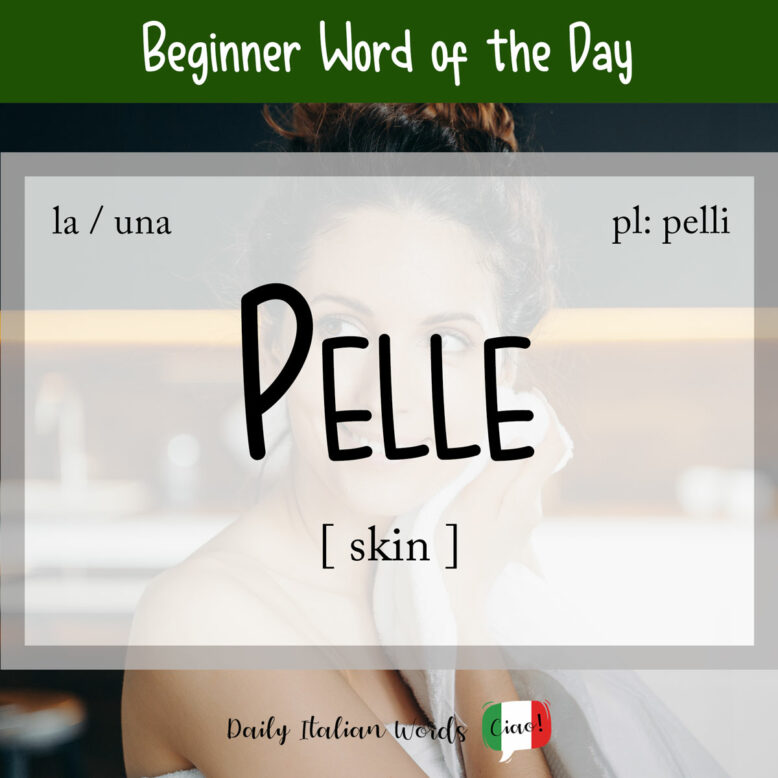The Italian word for human and animal skin is pelle (feminine, plural: pelli). It comes from the Latin pellis of the same meaning.

Learn with our video
Most human skin types can be described using the following adjectives:
- pelle secca = dry skin
- pelle grassa = oily skin
- pelle chiara = light skin
- pelle scura = dark skin
- pelle luminosa = glowing skin
- pelle liscia = smooth skin
- pelle ruvida = rough skin
- pelle rugosa = wrinkly skin
- pelle delicata = delicate skin
- pelle morbida = soft skin

Human skin color ranges from dark brown to almost colourless.
Biancaneve aveva le labbra rosse come una rosa, i capelli neri come l’ebano e la pelle bianca come la neve.
Snow White had lips as red as a rose, hair as black as ebony, and skin as white as snow.
Whereas in English, we have the separate term leather for the material made from tanned animal skin, Italians use either pelle or cuoio. For example, a leather bag would be una borsa in pelle / di cuoio and leather shoes would be scarpe in pelle / di cuoio in Italian.
Note: although the two words are often interchangeable, they don’t mean the exact same thing because the manufacturing process is different. Cuoio is a thicker more resistant type of leather than pelle.
Non indossare la giacca di pelle sotto la pioggia! Così la rovini!
Don’t wear your leather jacket in the rain! You’ll ruin it!
Pelle can also be used for the skin or peel of a fruit or vegetable but the synonym buccia is more common.
Quite often, Italians use pelle figuratively to mean a person’s life. Used in this sense, it is seen in the following expressions:
- amici per la pelle (lit: friends of the skin) = friends for life, best friends
- fare la pelle a qualcuno (lit: to skin someone) = to do someone in, to take someone’s life
- rischiare la pelle (lit: to risk one’s skin) = to risk one’s life
- giocare sulla pelle di qualcuno (lit: to play on somebody’s skin) = to put someone’s life at risk
- lasciarci / rimetterci la pelle (lit: to leave / lose one’s skin) = to die (by doing something)
- salvare la pelle = to save one’s skin / life
- vendere cara la pelle (lit: to sell one’s skin at a high price) = to fight for one’s life

Idiomatic expressions featuring ‘pelle’
There are dozens of idiomatic expressions in Italian in which pelle makes an appearance, so we’ve picked a few of the most common to share here!
Essere pelle e ossa
Literal translation: to be skin and bones
English meaning: to be skin and bones
Non stare più nella pelle
Literal translation: to not stay in one’s skin anymore
English meaning: to be beside oneself, to be very excited
Cambiare pelle
Literal translation: to change skin
English meaning: to reinvent oneself
Far accapponare la pelle
Literal translation: to make one’s skin creep
English meaning: to make one’s skin crawl
Vendere la pelle dell’orso prima di averlo ucciso
Literal translation: to sell the bear’s skin before killing it
English meaning: to count one’s chickens before they hatch
Avere i nervi a fior di pelle
Literal translation: to have nerves on the edge of your skin
English meaning: to be on edge, to be high-strung
Avere la pelle d’oca
Literal translation: to have goose skin
English meaning: to have goosebumps
This article is also available in video format on our YouTube channel. The audio version can be found on Podbean, Google Podcast, Apple Podcast and Spotify.
Heather Broster is a graduate with honours in linguistics from the University of Western Ontario. She is an aspiring polyglot, proficient in English and Italian, as well as Japanese, Welsh, and French to varying degrees of fluency. Originally from Toronto, Heather has resided in various countries, notably Italy for a period of six years. Her primary focus lies in the fields of language acquisition, education, and bilingual instruction.


